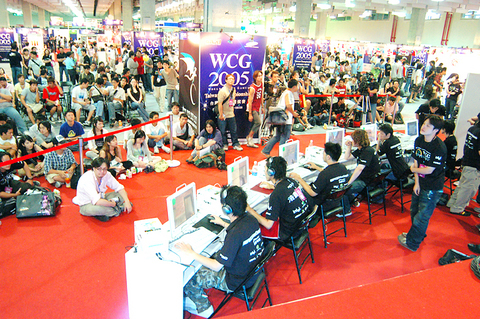Over 230 of the nation's top PC/console gamers primed their paddles and did battle in the National Taiwan Cyber Games Championship in Taipei last weekend. And for a lucky few it was a chance to prove that they had what it takes to represent Taiwan at the 2005 World Cyber Games (WCG), which will be held in Singapore this November.
Cheered on by hundreds of spectators, gamers battled it out for the top spots in Star Craft: Brood War, WarCraft: The Frozen Throne, Need for Speed: Underground 2 and Dead or Alive: Ultimate while team's spilled buckets of blood in Counter Strike.
After Saturday's hotly contested first round knockout competition the field of 230 had been whittled down to 28 individuals and four teams of five players.

PHOTO COURTESY OF OGILVY
The games took an average of 20 to 40 minutes to complete and by 5pm Sunday eight individuals and two teams of five had proved their gaming mettle and were ready to take on the world in Singapore come November.
Lin Chun-ta (
First held in Seoul in 2001, the WCG, which has been dubbed "the video game Olympics" by the gaming industry has grown to become the world's largest celebration of video gaming. This year an estimated 800 players representing 70 countries will compete in the annual event, which will make WCG 2005 the largest PC/console gaming competition to ever be staged outside of South Korea.
Along with gamers from more savvy PC/console gaming nations such as the US, Japan and Hong Kong this year's event is the first time players from Bangladesh and Turkmenistan will be participating in the event.
While Taiwan is expected to face stiff competition from experienced German, Brazilian and US gamers it is the South Korean team that local players like Chen Ko-wei (
"[The South Koreans] are always the team to watch. They treat the [WCGs] like its the Olympics. They train hard and do a lot a research in regard to tactics and how best to beat the opposition," said Chen who will represent Taiwan in the WarCraft: The Frozen Throne category.
"It will be a very tough game if we come up against them. I'd obviously like to beat [South Korea], but I'm not getting too optimistic about that happening."
Cyber Team Taiwan's players will be participating in five of the nine official games chosen for the 2005 competition. Regardless of the category, Cyber Team Taiwan's members will be hoping to emulate the successes of their peers in the 2003 WCG, when five players from Taiwan scored big and brought home four silver medals and one gold medal.
In order to ensure that the squad is at its best in the run up to the finals local sponsors Shuttle Inc will not only be providing players with up-to-date computer systems and software on which gamers can hone their skills, but they will also employ gaming coaches.
"It's the first time Taiwan's WCG team has had coaches and I think it will make a big difference," said event organizer Ricco Kwan (
Members of Cyber Team Taiwan will begin their individual training regimes in the coming weeks. Whether the special coaches will make a difference to outcome is still anybody's guess, but local gamers believe that Taiwan has what it takes to reach the final rounds of the WCG 2005 in at least three categories.
See: www. worldcybergames.com. Team Taiwan's link is in Chinese only.

The canonical shot of an East Asian city is a night skyline studded with towering apartment and office buildings, bright with neon and plastic signage, a landscape of energy and modernity. Another classic image is the same city seen from above, in which identical apartment towers march across the city, spilling out over nearby geography, like stylized soldiers colonizing new territory in a board game. Densely populated dynamic conurbations of money, technological innovation and convenience, it is hard to see the cities of East Asia as what they truly are: necropolises. Why is this? The East Asian development model, with

June 16 to June 22 The following flyer appeared on the streets of Hsinchu on June 12, 1895: “Taipei has already fallen to the Japanese barbarians, who have brought great misery to our land and people. We heard that the Japanese occupiers will tax our gardens, our houses, our bodies, and even our chickens, dogs, cows and pigs. They wear their hair wild, carve their teeth, tattoo their foreheads, wear strange clothes and speak a strange language. How can we be ruled by such people?” Posted by civilian militia leader Wu Tang-hsing (吳湯興), it was a call to arms to retake

This is a deeply unsettling period in Taiwan. Uncertainties are everywhere while everyone waits for a small army of other shoes to drop on nearly every front. During challenging times, interesting political changes can happen, yet all three major political parties are beset with scandals, strife and self-inflicted wounds. As the ruling party, the Democratic Progressive Party (DPP) is held accountable for not only the challenges to the party, but also the nation. Taiwan is geopolitically and economically under threat. Domestically, the administration is under siege by the opposition-controlled legislature and growing discontent with what opponents characterize as arrogant, autocratic

When Lisa, 20, laces into her ultra-high heels for her shift at a strip club in Ukraine’s Kharkiv, she knows that aside from dancing, she will have to comfort traumatized soldiers. Since Russia’s 2022 invasion, exhausted troops are the main clientele of the Flash Dancers club in the center of the northeastern city, just 20 kilometers from Russian forces. For some customers, it provides an “escape” from the war, said Valerya Zavatska — a 25-year-old law graduate who runs the club with her mother, an ex-dancer. But many are not there just for the show. They “want to talk about what hurts,” she